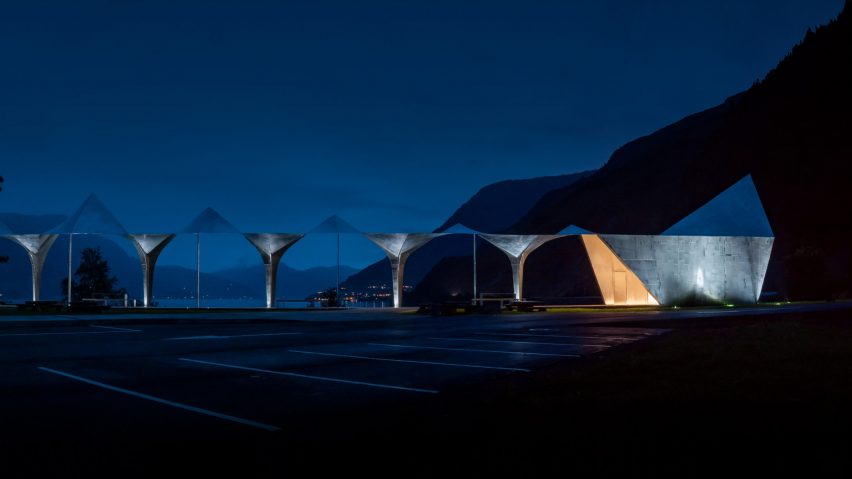Scandinavian studio Light Bureau has introduced minimal lighting to this rest-stop toilet along the Norwegian Scenic Routes so as not to distract visitors from the surrounding landscape.
Espenes Rest Stop accompanies the Hardanger stretch of the Norwegian Scenic Routes – 18 roads that offer picturesque drives across the country.
The structure itself was designed by Norwegian architecture firm Code but Light Bureau was brought in to devise a sensitive lighting scheme.
"Our challenge was to add lighting to the rest area without overwhelming the surroundings given its pristine location," said the studio.
"While being a functional rest stop, the structure must be experienced as a moment of pause on [visitors'] journeys and also be a landmark," Light Bureau added.
"Highway 13 that leads past Espenes is not illuminated, so we worked to find the right balance in light intensity and colour temperature to highlight the building."
The rest-stop toilets sit at the end of a 64-metre-long open-sided walkway, furnished with tables and benches where visitors can sit and look at the fjord.
Covering the walkway is a six-millimetre-thick stainless steel roof that juts upward at points to form sharp peaks, echoing the shape of the nearby mountains.
The roof is supported by a series of funnel-shaped steel columns, each lit from below by a small spot that was integrated into the floor.
These cast a cool glow reminiscent of moonlight across the underside of the roof, with only 40 watts of power used to illuminate the entire walkway.
"Even though all of the luminaires are ground recessed and are potential glare sources, the optics used and the placement was carefully calculated and tested to avoid these becoming a distraction," explained the studio.
"The reflections in the metal contribute to creating a changeable expression that grants an ethereal quality to the space."
Contrasting warm lighting was incorporated inside the toilets to evoke the feeling of entering a fire-lit cave. Bollard-style floor lamps feature in each of the cubicles while LED lights were fitted around their opalised glass doors.
A narrow strip of recessed lighting was also built into the corridor floor.
Lighting in the toilets is generally kept dim but sensors in the locks of the cubicle doors can trigger a more intense glow during periods of high footfall.
The studio consciously made the decision to not place any street lamps in the car park itself in a bid to minimise light pollution and keep focus on the structure's design and setting.
All of the steel used in the project was also sourced from a local metal workshop to reduce the miles the heavy material had to travel.
The Norwegian Scenic Routes are known for having visually striking bathroom facilities for road-trippers to enjoy. Other examples include a wave-shaped toilet by HZA and a mirrored toilet block by Morfeus Arkitekter.
Light Bureau's work on the Espenes Rest Stop has been shortlisted in the architectural lighting design category of this year's Dezeen Awards, competing against four other projects.
Among them is D/Dock's Fabrique des Lumières, a huge immersive art centre where works are projected onto the walls, and Void's Delta installation, which sends ripples of light through an Oslo neighbourhood.
The photography is by Fovea Studio.

